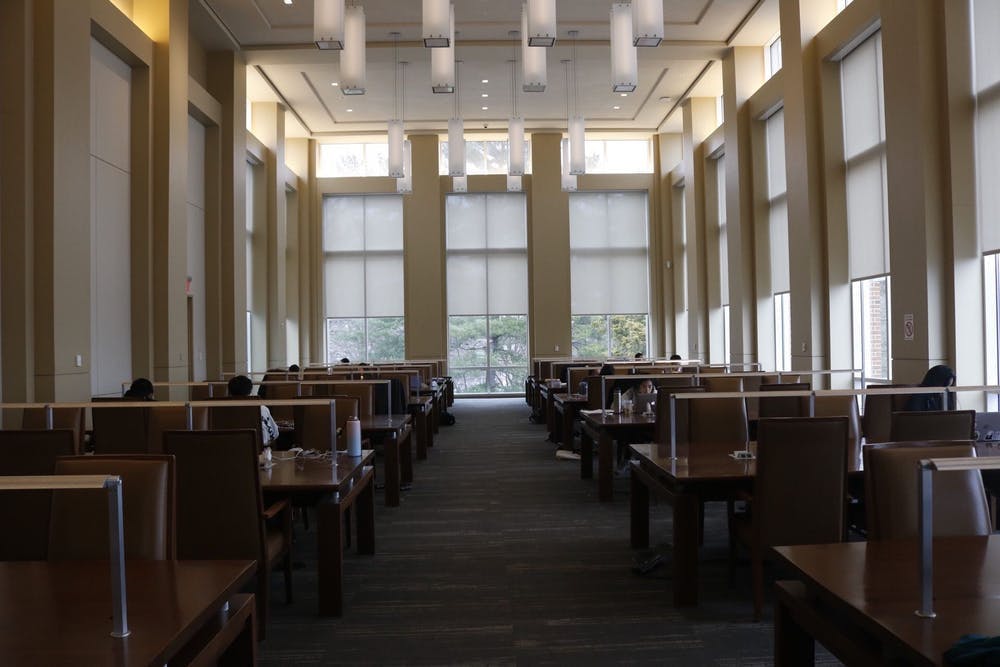The Stavros Niarchos Foundation (SNF) Agora Institute hosted a conversation with E.J. Dionne and Miles Rapoport on March 29 to discuss their new book 100% Democracy: The Case for Universal Voting. The conversation was moderated by Students Learn Students Vote Coalition (SLVC) Executive Director Clarissa Unger.
This event was also sponsored by the Baltimore Collegetown Network, Hopkins Votes, the Department of Political Science, the Hopkins Center for Talented Youth and the Maryland Institute College of Art Center for Creative Citizenship.
Sam Novey, a visiting fellow at the Agora Institute and co-founder of the SLVC, emphasized that 100% Democracy shows the importance of making sure the voting process fully represents all people in a functioning democracy.
“The book argues that universal participation in elections should be a cornerstone of our democracy, and really any democracy, and that it would protect against voter suppression, disenfranchisement of large groups of citizens, and it would create a system in which the government truly was based on consent of the governed,” he said.
Unger expressed hope that the conversation would help build a movement toward bolder ideas about democracy through full participation in local government.
Dionne, a Washington Post columnist and senior fellow at the Brookings Institution, spoke to the importance of making sure the democratic process fully represents all the people it is supposed to.
“If you have an electorate, which at this point is older, whiter, more educated and richer than the population as a whole, then you get political decisions that are skewed toward that group,” he said. “The idea is if you have an actual representative sampling, decisions will become different and more reflective of the needs of the population as a whole.”
Rapoport, senior practice fellow in American democracy at the Ash Center for Democratic Governance and Innovation at the Harvard Kennedy School, drew on his experience of running for secretary of the state of Connecticut to show how the current political process pushes candidates to choose their voters rather than appeal to the public as a whole.
He talked about how political advisors and campaign staff often wanted him to solely campaign to those who were marked as likely voters rather than all his constituents.
“We had lists of all registered voters, and then in the list they would also be further quoted as a likely voter, and I was told by my campaign people, ‘Do not stop and talk to anybody who is not on your list,’” he said. “‘If they're not on your list, they can't help you and you're wasting your time.’”
Dionne spoke about the idea of mandatory participation in voting similar. He compared the idea to jury duty.
“The Constitutional strength of this country begins with its citizens,” he said. “A jury gives ordinary people extraordinary power, and exactly the same thing can be said: I have the right to vote.”
They also focused on how historically, jury duty allowed defendants to be tried by a jury of their peers. Dionne spoke about how removing laws that barred Black Americans from serving on juries was a civil rights victory and directly allowed for greater participation and power in a democratic state.
Rapoport also acknowledged that mandating voting in a system that currently makes it extremely difficult for people to vote would be problematic and disproportionately hurt minority and lower-income neighborhoods. He proposed a series of gateway voting reforms that would need to be implemented to rectify this.
Sophomore DJ Quezada spoke about learning more about this proposal from the speakers.
“I just thought that it was incredible that the proposal to have mandatory voting is something that's gaining traction in the United States. I just found it amazing that people were talking about it and seriously campaigning to get it established in the United States,” he said.
Quezada alsowished that the speakers would have given more clarity on the implementation of mandatory voting. However, he felt that they were more than willing to engage with him in conversation.
“All three of the presenters were very personable and very approachable and were more than willing to engage in a long, spirited discussion about it after the presentation,” he said. “I thought that they were very genuine, and I wholeheartedly support their campaign and was very excited to see them presenting their book.”
Sophomore Ying Qin found it interesting how the speakers believe mandatory voting would make the country less polarized.
“They think this will actually help the political climate become less polarized because currently, only people who feel really strongly about politics will vote,” she said. “If everyone has to vote, even the people in the middle will vote, so then maybe the politics will be more geared toward people in the middle.”
Dionne emphasized the importance of voting in a democratic system and his hopes for future elections.
“We can have an Election Day that people look forward to as a celebration of freedom and not some kind of exercise where people make it as hard for you as possible to cast a ballot,” he said.





